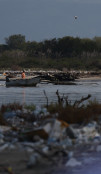“I am the mother of a Down Syndrome son, and he has made me strong”

Erjola Muzhaqi still recalls the first time she could feel her son moving inside her during pregnancy. She felt life growing and breathing in sync with her own. “He will be very active; how will I keep up with him running?” she thought, having just learned she was expecting a baby boy—her first child. But when he was born, he was so quiet.
“I remember holding him in my arms for the first time at the hospital. I was so happy—it’s a happiness you only feel when you become a parent for the first time. He was just like any other baby, but he was quiet; he didn’t even cry,” Muzhaqi recalls as a young mother.
Concerned about his condition, the doctors ordered diagnostic tests. Forty-eight hours after giving birth to Uenkli, they informed Erjola’s husband that their son had Down’s syndrome. “My husband didn’t tell me until Uenkli was two months old, trying to protect me. By that time, I had already noticed that he didn’t react like other children, he wasn’t making eye contact, he was sluggish, and he couldn’t hold his head up,” Erjola remembers.
At first, she and her husband were shocked and afraid of what lay ahead. They had just become parents, only to be told that their son might never talk, walk, read, or write. It was devastating—they felt powerless. Then they learned about therapies for children with Down’s syndrome.
“We started therapy when he was six months old, five times per week. Now he is ten years old, and we have therapy four times a week, plus swimming once a week,” says Erjola. Uenkli has undergone physical and occupational therapy to improve motor skills, posture, muscle strength, and balance. He has also received ABA therapy and speech therapy, which help with social, communication, and learning skills.
“I taught myself to fight for him and with him. We were so happy to have a baby boy, and then, as a mother, I told myself, I will keep going. I will help him become like the other children. And today, I am happy to see him. He has learned to speak some words, he goes to school, he walks, he plays with other children, and he is able to express love. He faces his own challenges, but I am proud of what we have achieved, because without therapy, these children cannot progress at all,” says Erjola in one of the therapy rooms at the Down Syndrome Albania Foundation.
Aiming to support parents facing challenges with their children and to provide inclusive services, the European Union in Albania has funded various initiatives under the call “Local Level Partnerships to Advance Social Inclusion in Albania.” As a result, the Pro Pak Service Centre at the Down Syndrome Albania Foundation has provided a range of services for people with disabilities. These include therapeutic services, maths and literacy courses to support children in inclusive education, and training sessions for professionals—teachers, physiotherapists, and speech therapists—working with these children. The centre has also introduced a Social Autonomy programme, designed to help adults with Down’s syndrome develop essential life skills.
“It was a programme for young people over 16 who had not attended early therapy sessions. They were taught how to cross the street, handle money, shop independently, go out with friends, and manage other practical tasks, helping them become more independent,” explains Mirela Juka from Down Syndrome Albania.
As part of the project, physiotherapy and speech therapy were also offered at home for children living in rural areas who were unable to travel to the city every day. In some cases, parents attended the sessions to learn how to support their children’s development. Under this social inclusion initiative, inaccessible rural areas such as Shkoza, Shëngjergj, Kashar, and Dajt were included in home therapy services.
The European Union’s goal is to create equal opportunities for different social groups. This support has aimed to fulfil that mission by improving outreach to vulnerable populations and ensuring a better future. “It’s a cycle—if they don’t receive therapy services, they don’t develop independence or social skills. This prevents them from being included in education and social life. They struggle to attend school, to play, and, later in life, to find employment,” explains Mirela Juka.
The project "Alliance for Enhancing Integrated Social Services & Good Governance in the Tirana Region" has provided an innovative range of social services for children and adults with disabilities in Tirana. It has also supported parents and caregivers in rural areas by teaching them simple techniques to monitor and support their child’s development in three key areas within the family environment.
Erjola Muzhaqi highlights the financial burden many parents face in trying to afford therapy, as at least one parent often has to dedicate their income solely to their child’s needs. But for her son, she says, she would do anything.
“The best thing Uenkli has ever told me is, ‘Mum, I love you.’ He painted a heart on a piece of paper and called out to me loudly—‘Mum!’—waving the paper in the air,” Erjola says, holding back tears.
She credits her strength to her son and urges other parents not to give up. “He has improved, and I have changed. He has made me stronger and happier,” she says.





